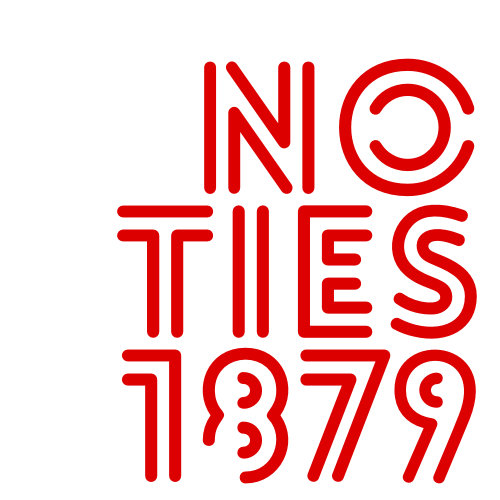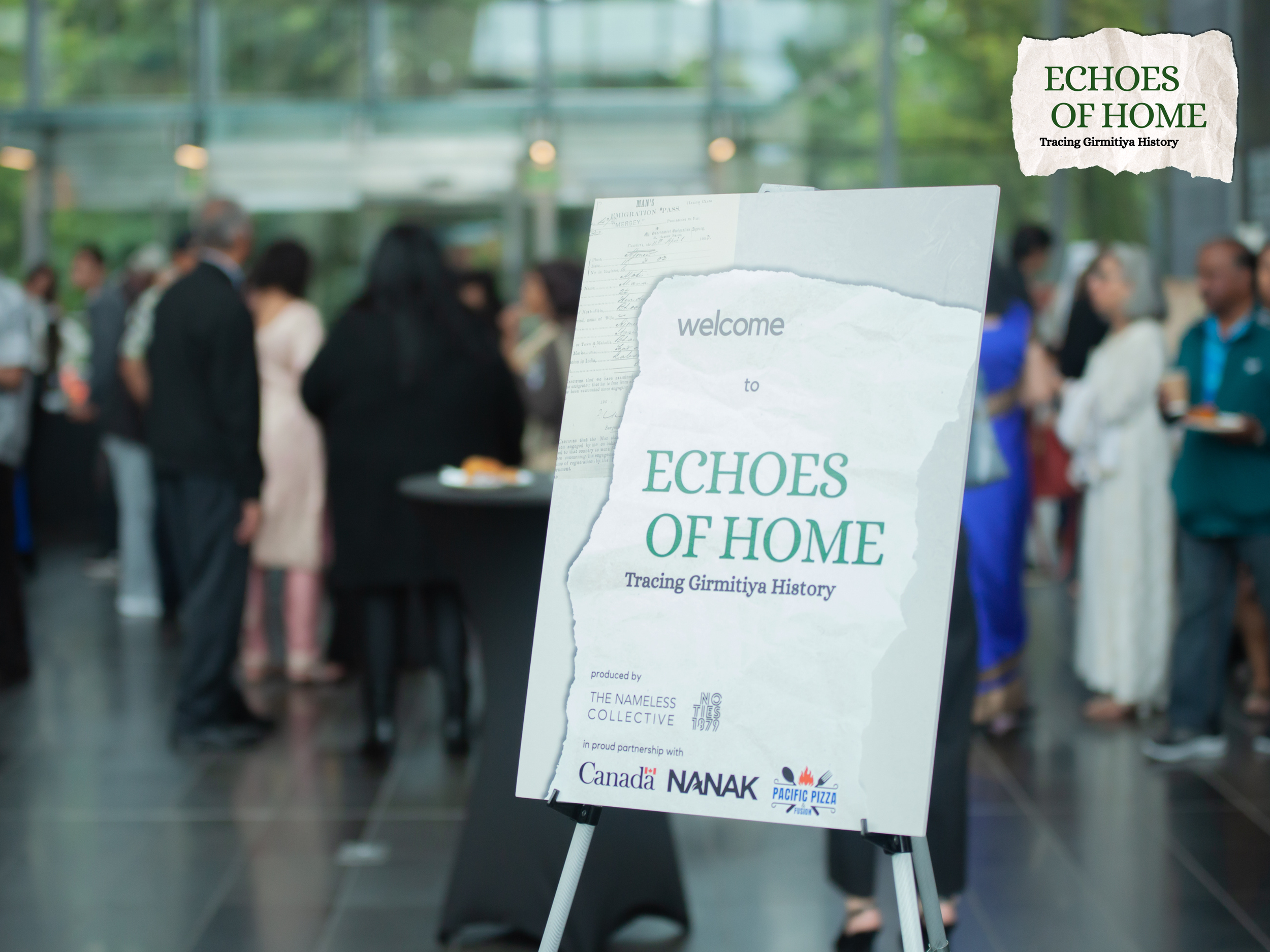
Echoes of home:
Tracing Girmitiya History
a community event that honours the lived histories and legacies of our Girmitiya ancestors—indentured labourers stolen from India and taken to Fiji under British colonial rule.
Curator’s Message:
Tracing our history.
Between 1879 and 1916, over 60,000 people left India for Fiji under the British colonial indentured labour system, ultimately changing the course of our collective history.
Labourers signed agreements which bound them to five-year contracts. They worked long days of backbreaking labour with little to no compensation, limited rights, and no way of returning home to India. The word “girmit” came from the word “agreement” referring to the contracts they signed, and eventually, these labourers were called Girmitiyas.
The children and grandchildren of Girmitiyas have now immigrated all over the world, including to the Lower Mainland, bringing with them their stories, traditions, culture and even collective trauma, connected by the vast Pacific Ocean to the Fiji homeland.
As curator of Echoes of Home: Tracing Girmitiya History, my hope was to create space for a community conversation about colonization, indentured labour, and Girmitiya history from a place of curiosity, learning, and empowerment. Through an exhibit, film, music and dialogue, the purpose was to gather at Surrey City Hall in the heart of the city – a space where I wanted my community to feel like their stories belonged.
My personal journey to find my family’s emigration passes not only took me to the National Archives of Fiji, but also opened up conversations with my parents, sister, and extended family. It also connected me with other Indo-Fijians in search of their stories, including what remains in the official and unofficial archive. Through these experiences, I learned how rich yet fragmented this history was.
Image Credit: Vikaash Prasad, Echoes of Home: Tracing Girmitiya History, 2025 - Ancestor Portraits
Image Credit: Vikaash Prasad, Echoes of Home: Tracing Girmitiya History, 2025 - Emigration Passes
Complex stories need telling.
Our intention for Echoes of Home was to invite guests to experience this history in multiple ways. We used various media and connection points—pictures, passes, food, space, music, song, spoken word, and art—for people to connect with these stories.
The lobby was designed as a place of gathering where people could meet new faces and familiar ones. The exhibit was intended to be driven by community members with a call-out for people to share their images and documents. One portion was inspired by the migration journey and the relationships formed on the ships. Two panels, resembling the wood on the ships, linked together several emigration passes with each pass providing details of the traveller’s name, village, family, caste, and occupation. The second part of the exhibit focused on family photos of Girmitiyas. Like walking into someone’s home and seeing images of families in frames or in albums, the goal was to highlight our lineages to the present.
This was the beginning of an unofficial record.
Image Credit: Vikaash Prasad, Echoes of Home: Tracing Girmitiya History, 2025 - Amika Kushwaha, Cassius Khan
Collective witnessing supports collective understanding.
The event itself featured three distinct ways to engage: film, music, and conversation. Narrated by Sangeev Bhaskar and featuring Dr. Brij Lal, a short screening of the 2002 BBC documentary, Coolies: How Britain Reinvented Slavery, helped uncover the realities of the indenture system and one person’s search for their roots.
Music was the second way we entered into an understanding of our collective history. Through an interpretation of bidesia poetry—poetry that speaks to the hardship of leaving home—and spoken word, Sheetal Naicker and Arif “Alite” Ali, accompanied by Vikash Raju on tabla, wove the past to the present showing the gaps and spaces we have between us. As the featured performance, Cassius Khan and Amika Kushwaha took us on a musical journey by telling us stories of migration. Using the rhythm of the harmonium and the beat of the tabla, they melodically took us on a journey from India to Fiji and had us longing to experience rainstorms on the island.
Our final segment of the evening brought us back to the present and ended in dialogue with panellists about the need to reclaim our history and identities. Angelene Prakash led Umendra Singh, Shiva Reddy, and Rochelle Prasad in an empowering conversation about our strength and resilience.
Echoes of Home was meant to leave audiences with curiosity. If there was one take-away from the evening, it was to continue the conversation. For those who would like to catch a glimpse of the event and what we experienced, I invite you to watch the reel below.
With gratitude,
Milan Singh
Video Credit: Marc Yungco, Echoes of Home: Tracing Girmitiya History, 2025
Postscript
I would like to acknowledge the traditional and ancestral territories of the Kwantlen, Kwikwetlem, Katzie, Qayqayt, Semiahmoo and Tsawwassen First Nations. It is important to recognize the First Peoples of this land. We can’t recognize our ancestors, our migration stories, and our resilience and reclamation without acknowledging the history, agency, and actions of Indigenous peoples here.
As curator, I had the privilege and honour of seeing our vision turn into reality. Produced by The Nameless Collective in partnership with No Ties 1879, Echoes of Home was shared with a sold-out audience of 200 people.
While the journey had a few setbacks and restarts, one aspect that was never wavering was the deep and constant commitment of the organizing team. Angelene Prakash led the overall event plan and social media while Sheetal Naicker prepared her performance, arranged the food, and coordinated volunteers. Sandhya Prasad was committed to connecting with people and added a personal touch with every interaction. Arif Ali edited the documentary and prepared his performance. Cassius Khan and Amika Kushwaha embraced the theme and showcased the Indo-Fijian experience through classical Hindustani music.
Vikaash Prasad was our official photographer and led tech/AV and supported the event organizers in several aspects of planning and coordination. Marc Yungco captured the event through video and produced the highlight reel – each of them documenting the impact of the event.
The event was funded by Canadian Heritage and the Government of Canada. This is not taken lightly as it was the first time the Indo-Fijian community received grant funding and recognition from the Canadian government. We also have incredible supporters from businesses: food was sponsored and donated by Raj Arneja of Nanak Foods and prepared by Chef Veenal Chand of Pacific Pizza and Fusion.
Of course, events are not possible without volunteers. With gratitude to Rupi Chandra, Fazia Dean, Areen Hash, Tia Ali, Tai Ali, Ashneil Prakash, Brandon Singh and Riley Wicks for committing your time and energy on event day.
Finally, a thank you to our families that supported us in so many ways behind the scenes. From hosting our planning meetings, acting as sounding boards, to giving us their endless time, you showed up constantly and consistently. Importantly, they shared words of encouragement when we were tired and close to the finish line and believed in our vision without question. On a personal note, my mom understood the intention and value of this event from the very first time I said the idea out loud. It was meaningful to her, and she expressed unequivocal support to the entire team:
this one was for you, Ma.
Photo Credit: Vikaash Prasad, Echoes of Home: Tracing Girmitiya History, 2025 - Entrance & Lobby, Surrey City Hall
Image Credit: Vikaash Prasad, Echoes of Home: Tracing Girmitiya History, 2025 - Milan Singh, Curator
“Once legally, slavery was abolished, there needed to be another mechanism or scheme for labour across the colonies to continue,” Singh explains. “This was the next scheme or sort of way for cultivation and colonization to continue across the globe.”
— Milan Singh, Interview with The Source Newspaper






